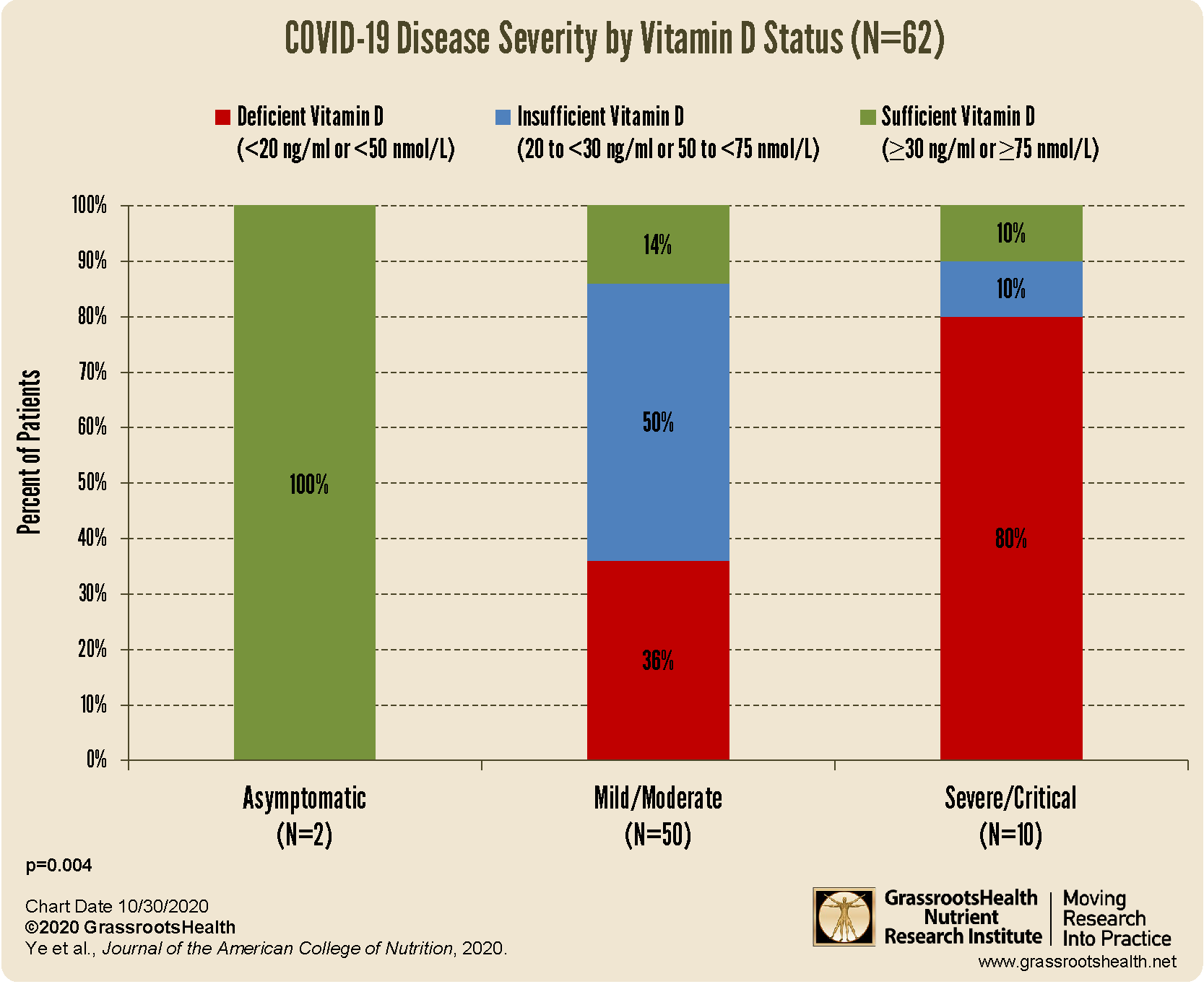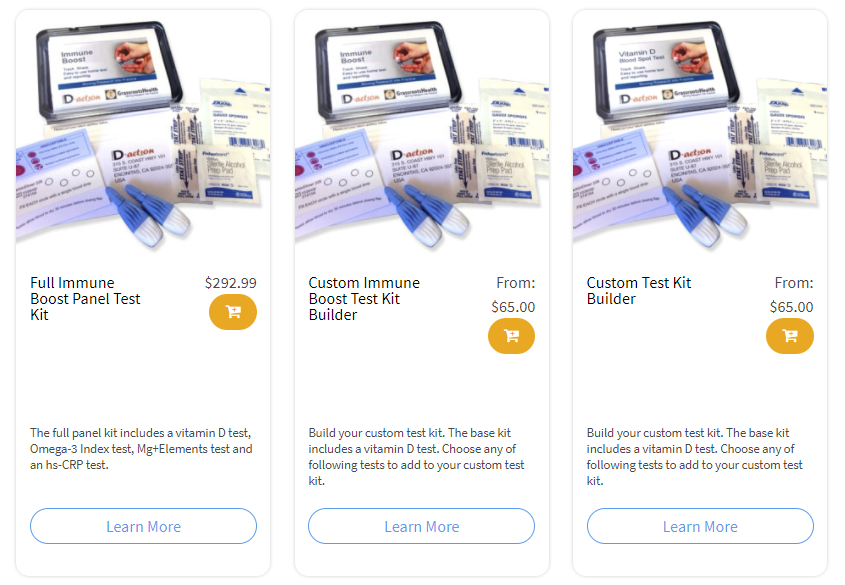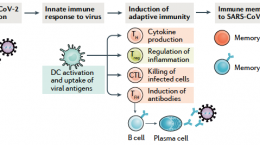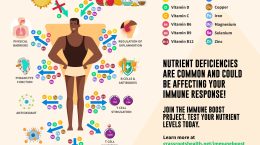Published on November 4, 2020
A case-controlled study shows 80% of patients with severe or critical cases of COVID-19 were also vitamin D deficient at hospital admission
 Approximately 19% of patients who test positive for COVID-19 have symptoms severe enough to require hospitalization, and of those, 3.37%-17% developed acute respiratory distress syndrome (ARDS) with 5%-26.1% requiring admission to intensive care. There are several known risk factors for the severity of COVID-19 disease, including older age, certain comorbidities (such as diabetes and hypertension), and vitamin D deficiency.
Approximately 19% of patients who test positive for COVID-19 have symptoms severe enough to require hospitalization, and of those, 3.37%-17% developed acute respiratory distress syndrome (ARDS) with 5%-26.1% requiring admission to intensive care. There are several known risk factors for the severity of COVID-19 disease, including older age, certain comorbidities (such as diabetes and hypertension), and vitamin D deficiency.
Vitamin D Shown to Improve COVID-19 Outcomes
Many studies have been published showing an association between low vitamin D levels and increased risk and severity of COVID-19 disease. Some studies among vitamin D deficient COVID-19 patients have also shown improvement in symptoms and survival rates with vitamin D supplementation, indicating that replenishing vitamin D is helpful for improving COVID-19 disease outcome. Current available data suggests that avoiding or correcting vitamin D deficiency at any point during the COVID-19 pandemic may improve outcomes overall. This all makes sense, considering the role vitamin D plays in immune health, including immune and inflammation modulating functions directly within the lungs.
New Study Confirms Relationship Between Vitamin D Status and COVID-19 Disease Severity
In a case-controlled study, Ye et al. compared vitamin D levels of 80 healthy controls to those of 62 hospitalized COVID-19 patients to determine if there was a relationship between vitamin D level and COVID-19 infection and severity. The study included all patients with COVID-19 treated at a hospital in China between February 16, 2020 and March 16, 2020. Vitamin D levels were measured at the time of hospital admission and were defined as deficient (<20 ng/ml or <50 nmol/L), insufficient (20 to <30 ng/ml or 50 to <75 nmol/L), or sufficient (≥30 ng/ml or ≥75 nmol/L), according to the Endocrine Society clinical guidelines.
What did the study find?
Among COVID-19 positive patients 42% were vitamin D deficient and the average level was 22.3 ng/ml (55.6 nmol/L), compared to 19% deficient and an average level of 28.8 ng/ml (71.8 nmol/L) among healthy controls. Patients with severe/critical COVID-19 cases were more likely to be older, have comorbidities, and have lower vitamin D levels than patients with mild/moderate cases.
As illustrated in the chart above, vitamin D deficiency was found in 80% of severe/critical cases, compared to only 36% of mild/moderate cases, and neither of two who were asymptomatic but had tested positive. The significance remained even after adjusting for all confounders. Vitamin D deficiency was also found among all patients requiring mechanical ventilation (5) and all patients experiencing shock (4).
Do you know YOUR vitamin D level? Could deficiency be hindering your body’s immune response?
Nutrients work synergistically in order to carry out specific functions within the body. For example, we have recently discussed how different immune cells rely on a variety of nutrients, including vitamins D, C, B6, B12, zinc, and magnesium, in order to carry out their actions in an immune response. Without these necessary nutrients, immune function may be hindered.
Could a nutrient deficiency be putting a damper on your immune response? Find out by testing your vitamin D, omega-3s, magnesium and other essential elements (including selenium), as well as your inflammation levels, with the new Immune Boost home test kit offered by GrassrootsHealth. Measuring levels is the only way to know if you are supporting your immune system and whether additional changes should be made, with supplementation, dietary changes, or both.
Enroll now with the Full Immune Boost Panel (which includes tests for vitamin D, Omega-3 Index, magnesium, zinc, selenium, copper, and hsCRP), and get 10% off when you use coupon code BoostTen at checkout.
What Does it Take YOU to Get Your D to 40 ng/ml (100 nmol/L)?
Did you know your health could be greatly affected by making sure you have a vitamin D level of at least 40 ng/ml (100 nmol/L)? Help us help you.
STEP 1 – Do you know what your vitamin D level is? If not, be sure to test today to find out.
STEP 2 – Determine your target level. Are you at your target level? Experts recommend a level of at least 40-60 ng/ml (100-150 nmol/L).
STEP 3 – Need to boost your level? Use the D*calculator to see how much vitamin D it may take to reach your target. Opt for the Loading Dose for a quicker boost.
STEP 4 – Optimize how your body absorbs and utilizes vitamin D with co-nutrients and these simple steps.
STEP 5 – Re-Test! This is an important step to make sure you have reached your target level, and to ensure you are not taking too much! Re-testing after 3-4 months is recommended.
STEP 6 – Adjust, Repeat…
Give your immune system the nutrients it needs to support a healthy you and protect yourself from unnecessary diseases, especially COVID-19.
NEWS ALERT
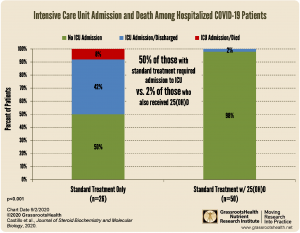 The first Randomized Controlled Trial on vitamin D and COVID-19 has shown a 96% lower risk of ICU admission for those receiving vitamin D (as 25(OH)D to quickly boost vitamin D blood levels) along with the standard treatment, compared to those receiving standard treatment alone.
The first Randomized Controlled Trial on vitamin D and COVID-19 has shown a 96% lower risk of ICU admission for those receiving vitamin D (as 25(OH)D to quickly boost vitamin D blood levels) along with the standard treatment, compared to those receiving standard treatment alone.
These results support many previous observational studies showing a relationship between vitamin D levels and intake and COVID-19 severity.
Review the Latest Nutrient Research for COVID-19
GrassrootsHealth Nutrient Research Institute has launched the new Immune Boost project with the use of our myData-myAnswers nutrient health system that nearly 15,000 people are already using for their health. Specific markers that influence immune health are suggested for testing as part of this project including:
- Vitamin D
- Omega-3 Index
- Essential elements magnesium, selenium, and zinc
- hsCRP
Our goal is to demonstrate how one can use the Nutrient Research Model established by Dr. Robert Heaney to show the effect of vitamin D serum levels of at least 40 ng/ml (100 nmol/L) on risk reduction for all ethnicities in the population. Status and intake of other nutrients will also be analyzed for any type of relationship to immune status and symptom severity. Join the project today!
Please let us know if you’re interested in helping sponsor this project.
CLICK HERE for updates and new information about the project.
Through GrassrootsHealth Nutrient Research Institute, you can also test your essential elements magnesium, copper, zinc and selenium, toxins such as lead, mercury and cadmium, as well as your omega-3 levels, inflammation levels and thyroid stimulating hormone (TSH) level. Find out your levels today! Log on to the test selection page (click the link below) to get your tests and see for yourself if your levels can be improved.
Make sure you track your results before and after, about every 6 months!
Click Here to Access the Test Page
How can I track my nutrient intake and levels over time?
To help you track your supplement use and nutrient levels, GrassrootsHealth has created the Personal Health Nutrient Decision System called
For each specific supplement, you can track what days you take it, how much, and many other details. This will help you know your true supplemental intake and what patterns of use work for you to reach and maintain optimum nutrient levels. Check it out today!


